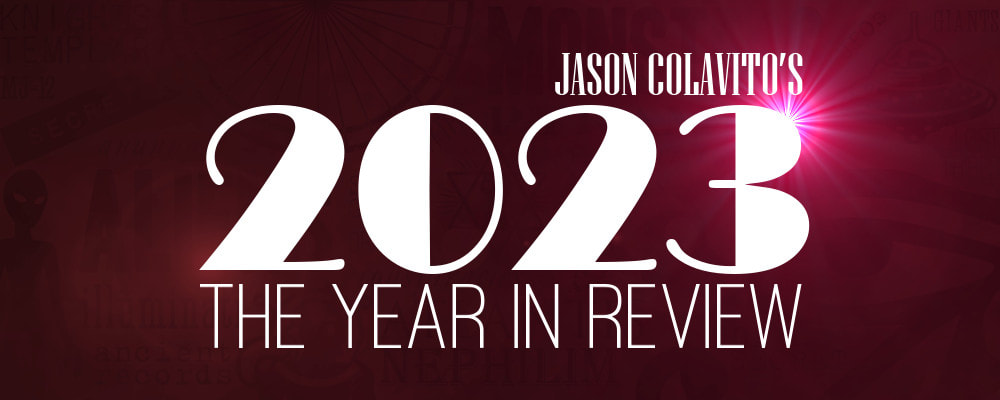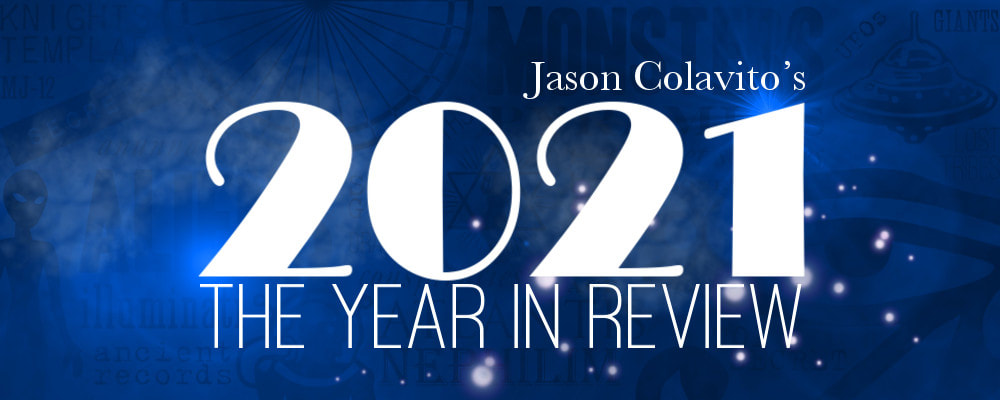|
No wonder Graham Hancock has been testy. An article yesterday in The Guardian says that the U.S. filming on the new season of Ancient Apocalypse was scuttled after the production ran into difficulties with obtaining permission to film at some locations. Hancock’s program received permits to film at Chaco Canyon and the Grand Canyon for an episode on the peopling of the Americas. Several days of filming had already been completed at Chaco Canyon, but ITN, the company behind the series, pulled out of the U.S. and will scrap the episode in favor of a non-American location. The Guardian piece implies that the difficulty was with Native tribes, who spoke out against Hancock’s hijacking of their history and opposed efforts to film at ancestral sites. Grand Canyon National Park sought to deny Hancock a permit based on objections from Native groups, but federal officials in Washington overrode their objections to issue the permit—since the government can’t pick and choose permits by viewpoint. Tribal locations, though, can do what they like. Read the full story at the Guardian.
9 Comments
On The Joe Rogan Experience, archaeologist Flint Dibble debated Graham Hancock for more than four hours about the existence of a lost civilization. You will forgive me that I did not have the time to watch the full podcast—it is simply too long—but you are of course welcome to watch below. I watched about half, from various segments of the podcast. I noticed in the parts I did see that Hancock seemed a bit underprepared to encounter the nuts and bolts of how archaeology is actually done, leaving him to complain that archaeologists have simply missed all of the evidence for a lost civilization, despite Dibble’s clear presentation of how archaeology actually works and the methodology of science and the signatures of large-scale settlements, such as evidence of agriculture, that should survive even the most thorough cataclysm.
I suppose I shouldn’t be too surprised that after just three cobbled-together clip shows to start its new season, Ancient Aliens is already going on a break, substituting an even longer, multi-hour clip show under the Ancient Aliens Declassified brand. Anyhow, it turns out that I missed a bizarre appearance in which Tucker Carlson has some things to say about ancient history after descending further into the Ancient Aliens / Ancient Apocalypse rabbit hole.
Another year has passed us by, and it seems that each one is somehow a little bit darker than the one before. I’ll be honest: I had a hard time bringing myself to write this year-end wrap-up this year. It’s been a hard twelve months. At the beginning of the year, the release of generative A.I. completely destroyed my career, wiping out virtually the entire industry of business writing that was my bread and butter. It happened so quickly and so destructively that CBS’s 60 Minutes came out to Albany to interview me about losing my job to a machine, and then I experienced a double humiliation when the venerable newsmagazine called me a few hours before my interview was scheduled to air to tell me that they cut me from the story and replaced me with an interview with a generative A.I. chatbot.
In case you didn’t see it, Graham Hancock appeared on Russell Brand’s podcast this past week to promote Ancient Apocalypse and to attack archaeologists yet again for being mean to him by asking for evidence for his claims. Hancock looks tired and angry during the interview, and even Brand notes that he seems unduly dejected and downtrodden for a man with one of the world’s most popular streaming nonfiction series. The probable origin of the Kensington Runestone's runes has been found: The runic alphabet from the stone, with its distinctive "hooked X," was taught in a mid-19th century Swedish calligraphy school and the textbook its instructor published. It includes "Masonic" characters like those used by the Larsson brothers, whose runic writing had previously been the only other known runic use of the "hooked X."
Magnus Källström of the National Antiquities Office in Sweden published the results of his investigation last week. The key was in an 1876 textbook published by Eric Ström, an itinerant calligrapher (!): Netflix released the first viewership figures for Graham Hancock’s Ancient Apocalypse, and the numbers were less impressive than I expected. Netflix reported that for the week of Nov. 14-20, the show’s first full week of release, viewers of Netflix’s English-language services worldwide watched 24.61 million hours of the show. By contrast, the comedy series Dead to Me had 30.3 million hours viewed in half the time (it was released mid-week) and Warrior Nun, released the same day as Apocalypse, had 27.74 million hours viewed. All of them paled before 1899, which had nearly 80 million hours viewed in its first few days of release.
Writing my annual year in review article used to be amusing, if not actually fun, because there was at least some entertainment value in seeing the wild claims and fantastical speculations that passed for history and science. But each year has been a little darker than the one before, and the job is less an exercise in tut-tutting foolishness than it is a depressing reminder that wealthy and powerful people are pushing conspiracies whose real-life consequences are no longer hypothetical but manifest every day in ways large and small, from the halls of Congress to hospital ICUs.
In a recent podcast interview, former television personality Scott Wolter made a bizarre assertion about prehistoric space aliens, a part of his ongoing conversion to full ancient astronaut theorist. Wolter discussed the documents he has asserted to be medieval records from the Knights Templar for the past several years, and in “new” Templar documents conveniently mirroring his own conversion to ancient alien enthusiast, he claims to have discovered evidence that space aliens intervened in human history.
|
AuthorI am an author and researcher focusing on pop culture, science, and history. Bylines: New Republic, Esquire, Slate, etc. There's more about me in the About Jason tab. Newsletters
Enter your email below to subscribe to my newsletter for updates on my latest projects, blog posts, and activities, and subscribe to Culture & Curiosities, my Substack newsletter.
Categories
All
Terms & ConditionsPlease read all applicable terms and conditions before posting a comment on this blog. Posting a comment constitutes your agreement to abide by the terms and conditions linked herein.
Archives
July 2024
|
- Home
- Blog
- Books
-
Articles
-
Newsletter
>
- Television Reviews >
- Book Reviews
- Galleries >
- Videos
-
Collection: Ancient Alien Fraud
>
- Chariots of the Gods at 50
- Secret History of Ancient Astronauts
- Of Atlantis and Aliens
- Aliens and Ancient Texts
- Profiles in Ancient Astronautics >
- Blunders in the Sky
- The Case of the False Quotes
- Alternative Authors' Quote Fraud
- David Childress & the Aliens
- Faking Ancient Art in Uzbekistan
- Intimations of Persecution
- Zecharia Sitchin's World
- Jesus' Alien Ancestors?
- Extraterrestrial Evolution?
- Collection: Skeptic Magazine >
- Collection: Ancient History >
- Collection: The Lovecraft Legacy >
- Collection: UFOs >
- Scholomance: The Devil's School
- Prehistory of Chupacabra
- The Templars, the Holy Grail, & Henry Sinclair
- Magicians of the Gods Review
- The Curse of the Pharaohs
- The Antediluvian Pyramid Myth
- Whitewashing American Prehistory
- James Dean's Cursed Porsche
-
Newsletter
>
-
The Library
-
Ancient Mysteries
>
-
Ancient Texts
>
- Mesopotamian Texts >
-
Egyptian Texts
>
- The Shipwrecked Sailor
- Dream Stela of Thutmose IV
- The Papyrus of Ani
- Classical Accounts of the Pyramids
- Inventory Stela
- Manetho
- Eratosthenes' King List
- The Story of Setna
- Leon of Pella
- Diodorus on Egyptian History
- On Isis and Osiris
- Famine Stela
- Old Egyptian Chronicle
- The Book of Sothis
- Horapollo
- Al-Maqrizi's King List
- Teshub and the Dragon
- Hermetica >
- Hesiod's Theogony
- Periplus of Hanno
- Ctesias' Indica
- Sanchuniathon
- Sima Qian
- Syncellus's Enoch Fragments
- The Book of Enoch
- Slavonic Enoch
- Sepher Yetzirah
- Tacitus' Germania
- De Dea Syria
- Aelian's Various Histories
- Julius Africanus' Chronography
- Eusebius' Chronicle
- Chinese Accounts of Rome
- Ancient Chinese Automaton
- The Orphic Argonautica
- Fragments of Panodorus
- Annianus on the Watchers
- The Watchers and Antediluvian Wisdom
-
Medieval Texts
>
- Medieval Legends of Ancient Egypt >
- The Hunt for Noah's Ark
- Isidore of Seville
- Book of Liang: Fusang
- Agobard on Magonia
- Book of Thousands
- Voyage of Saint Brendan
- Power of Art and of Nature
- Travels of Sir John Mandeville
- Yazidi Revelation and Black Book
- Al-Biruni on the Great Flood
- Voyage of the Zeno Brothers
- The Kensington Runestone (Hoax)
- Islamic Discovery of America
- The Aztec Creation Myth
-
Lost Civilizations
>
-
Atlantis
>
- Plato's Atlantis Dialogues >
- Fragments on Atlantis
- Panchaea: The Other Atlantis
- Eumalos on Atlantis (Hoax)
- Gómara on Atlantis
- Sardinia and Atlantis
- Santorini and Atlantis
- The Mound Builders and Atlantis
- Donnelly's Atlantis
- Atlantis in Morocco
- Atlantis and the Sea Peoples
- W. Scott-Elliot >
- The Lost Atlantis
- Atlantis in Africa
- How I Found Atlantis (Hoax)
- Termier on Atlantis
- The Critias and Minoan Crete
- Rebuttal to Termier
- Further Responses to Termier
- Flinders Petrie on Atlantis
- Amazing New Light (Hoax)
- Lost Cities >
- OOPARTs
- Oronteus Finaeus Antarctica Map
- Caucasians in Panama
- Jefferson's Excavation
- Fictitious Discoveries in America
- Against Diffusionism
- Tunnels Under Peru
- The Parahyba Inscription (Hoax)
- Mound Builders
- Gunung Padang
- Tales of Enchanted Islands
- The 1907 Ancient World Map Hoax
- The 1909 Grand Canyon Hoax
- The Interglacial Period
- Solving Oak Island
-
Atlantis
>
- Religious Conspiracies >
-
Giants in the Earth
>
-
Fossil Origins of Myths
>
- Fossil Teeth and Bones of Elephants
- Fossil Elephants
- Fossil Bones of Teutobochus
- Fossil Mammoths and Giants
- Giants' Bones Dug Out of the Earth
- Fossils and the Supernatural
- Fossils, Myth, and Pseudo-History
- Man During the Stone Age
- Fossil Bones and Giants
- Mastodon, Mammoth, and Man
- American Elephant Myths
- The Mammoth and the Flood
- Fossils and Myth
- Fossil Origin of the Cyclops
- History of Paleontology
- Fragments on Giants
- Manichaean Book of Giants
- Geoffrey on British Giants
- Alfonso X's Hermetic History of Giants
- Boccaccio and the Fossil 'Giant'
- Book of Howth
- Purchas His Pilgrimage
- Edmond Temple's 1827 Giant Investigation
- The Giants of Sardinia
- Giants and the Sons of God
- The Magnetism of Evil
- Tertiary Giants
- Smithsonian Giant Reports
- Early American Giants
- The Giant of Coahuila
- Jewish Encyclopedia on Giants
- Index of Giants
- Newspaper Accounts of Giants
- Lanier's A Book of Giants
-
Fossil Origins of Myths
>
-
Science and History
>
- Halley on Noah's Comet
- The Newport Tower
- Iron: The Stone from Heaven
- Ararat and the Ark
- Pyramid Facts and Fancies
- Argonauts before Homer
- The Deluge
- Crown Prince Rudolf on the Pyramids
- Old Mythology in New Apparel
- Blavatsky on Dinosaurs
- Teddy Roosevelt on Bigfoot
- Devil Worship in France
- Maspero's Review of Akhbar al-zaman
- The Holy Grail as Lucifer's Crown Jewel
- The Mutinous Sea
- The Rock Wall of Rockwall
- Fabulous Zoology
- The Origins of Talos
- Mexican Mythology
- Chinese Pyramids
- Maqrizi's Names of the Pharaohs
-
Extreme History
>
- Roman Empire Hoax
- American Antiquities
- American Cataclysms
- England, the Remnant of Judah
- Historical Chronology of the Mexicans
- Maspero on the Predynastic Sphinx
- Vestiges of the Mayas
- Ragnarok: The Age of Fire and Gravel
- Origins of the Egyptian People
- The Secret Doctrine >
- Phoenicians in America
- The Electric Ark
- Traces of European Influence
- Prince Henry Sinclair
- Pyramid Prophecies
- Templars of Ancient Mexico
- Chronology and the "Riddle of the Sphinx"
- The Faith of Ancient Egypt
- Remarkable Discoveries Within the Sphinx (Hoax)
- Spirit of the Hour in Archaeology
- Book of the Damned
- Great Pyramid As Noah's Ark
- Richard Shaver's Proofs
-
Ancient Texts
>
-
Alien Encounters
>
-
US Government Ancient Astronaut Files
>
- Fortean Society and Columbus
- Inquiry into Shaver and Palmer
- The Skyfort Document
- Whirling Wheels
- Denver Ancient Astronaut Lecture
- Soviet Search for Lemuria
- Visitors from Outer Space
- Unidentified Flying Objects (Abstract)
- "Flying Saucers"? They're a Myth
- UFO Hypothesis Survival Questions
- Air Force Academy UFO Textbook
- The Condon Report on Ancient Astronauts
- Atlantis Discovery Telegrams
- Ancient Astronaut Society Telegram
- Noah's Ark Cables
- The Von Daniken Letter
- CIA Psychic Probe of Ancient Mars
- Scott Wolter Lawsuit
- UFOs in Ancient China
- CIA Report on Noah's Ark
- CIA Noah's Ark Memos
- Congressional Ancient Aliens Testimony
- Ancient Astronaut and Nibiru Email
- Congressional Ancient Mars Hearing
- House UFO Hearing
- Ancient Extraterrestrials >
- A Message from Mars
- Saucer Mystery Solved?
- Orville Wright on UFOs
- Interdimensional Flying Saucers
- Poltergeist UFOs
- Flying Saucers Are Real
- Report on UFOs
-
US Government Ancient Astronaut Files
>
-
The Supernatural
>
- The Devils of Loudun
- Sublime and Beautiful
- Voltaire on Vampires
- Demonology and Witchcraft
- Thaumaturgia
- Bulgarian Vampires
- Religion and Evolution
- Transylvanian Superstitions
- Defining a Zombie
- Dread of the Supernatural
- Vampires
- Werewolves and Vampires and Ghouls
- Science and Fairy Stories
- The Cursed Car
-
Classic Fiction
>
- Lucian's True History
- Some Words with a Mummy
- The Coming Race
- King Solomon's Mines
- An Inhabitant of Carcosa
- The Xipéhuz
- Lot No. 249
- The Novel of the Black Seal
- The Island of Doctor Moreau
- Pharaoh's Curse
- Edison's Conquest of Mars
- The Lost Continent
- Count Magnus
- The Mysterious Stranger
- The Wendigo
- Sredni Vashtar
- The Lost World
- The Red One
- H. P. Lovecraft >
- The Skeptical Poltergeist
- The Corpse on the Grating
- The Second Satellite
- Queen of the Black Coast
- A Martian Odyssey
- Classic Genre Movies
-
Miscellaneous Documents
>
- The Balloon-Hoax
- A Problem in Greek Ethics
- The Migration of Symbols
- The Gospel of Intensity
- De Profundis
- The Life and Death of Crown Prince Rudolf
- The Bathtub Hoax
- Crown Prince Rudolf's Letters
- Position of Viking Women
- Employment of Homosexuals
- James Dean's Scrapbook
- James Dean's Love Letters
- The Amazing James Dean Hoax!
- James Dean, The Human Ashtray
- Free Classic Pseudohistory eBooks
-
Ancient Mysteries
>
- About Jason
- Search
© 2010-2024 Jason Colavito. All rights reserved.








 RSS Feed
RSS Feed
